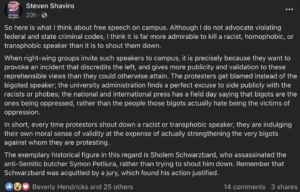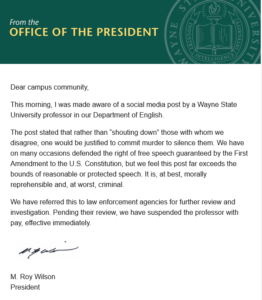The Volokh Conspiracy
Mostly law professors | Sometimes contrarian | Often libertarian | Always independent
Professor Suggests Murder as Alternative to Shouting Down Speakers
An English professor at Wayne State University apparently had an overheated reaction to the fiasco at Stanford Law School. He thought the protesters did not go far enough, and he took to Facebook to say so.
"I think it is far more admirable to kill a racist, homophobic, or transphobic speaker than it is to shout them down,"he began, and he concluded with "The exemplary historical figure in this regard is Sholem Schwarzbard, who assassinated the anti-Semitic butcher Symon Petliura, rather than trying to shout him down. Remember that Schwarzbard was acquitted by a jury, which found his action justified."
The president of Wayne State has now announced that the professor has been suspended and his social media post referred to law enforcement.
The professor's post is almost certainly constitutionally protected as neither a true threat nor an incitement to imminent lawless action. Wayne State, like many universities, has adopted the language American Association of University Professors' 1940 Statement on Academic Freedom. Under that policy, when speaking in public as a citizen a professor should be free from institutional censorship or discipline. Once the police investigation concludes, the professor's suspension should be lifted.
The professor would be well-advised to take a break from social media. Negative partisanship has gotten quite intense in our current environment, and the number of individuals who like to fantasize on social media about the death of their political opponents is truly disturbing.
Now would be a good time for the professor to recall the admonition in the AAUP Statement and the university's policy:
As a person of learning and an educational officer, he/she should remember that the public may judge his/her profession and his/her institution by his/her utterances. Hence he/she should at all times be accurate, should exercise appropriate restraint, should show respect for the opinions of others, and should make every effort to indicate that he/she is not an institutional spokesperson.





Show Comments (170)